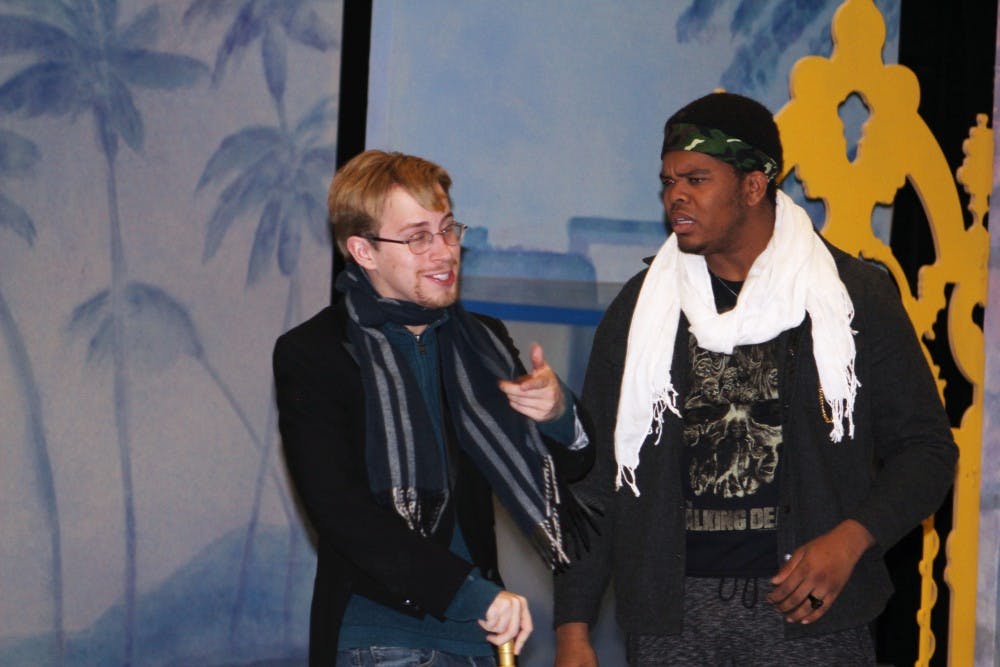With its premiere only days away, the cast and crew of this year’s Winter Stock Theater production of William Shakespeare’s “All’s Well That Ends Well” is making the final touches to bring the classic play to life.
“All’s Well That Ends Well” tells the story of unrequited love and what a young woman is willing to go through to win the love of her life.
Each year, Elon University’s performing arts department offers the course “Winter Stock Theater,” which combines both a class and preparation for the full-length show.
The actors are cast before November so they have time before the rehearsal period to memorize lines. Actors have been working eight hour days since the start of Winter Term.
“All’s Well That Ends Well” is one of Shakespeare’s lesser-known works, which director Fred Rubeck, professor of performing arts and chair of the department of performing arts, said has worked to the actors’ advantage.
“It’s kind of cool to think about one of the most famous playwrights and bringing one of his lesser known pieces to life,” Rubeck said. “It’s the kind of freedom that gives us because it doesn’t carry all the same baggage that the more famous ones do. We’ve been able to make it our own.”
The script has not been changed aside from some line cuts, which most directors do when working with Shakespeare to adapt it for modern audiences.
Instead of completely changing the literature, Rubeck has chosen to set the play in the early 20th century in Europe between World War I and World War II.
This change will be reflected in the set and costumes the actors wear.
“The play has a lot of issues about men and women and women’s rights, so the idea of early 20th century and women’s rights and suffrage has become a lot more of a hot button topic around the world, which made it a decent time for the show,” Rubeck said.
Senior Hunter McCormick, who plays The Countess, one of the leading roles in the show, said the alterations allow the audience to connect more with the story.
“The great thing about Shakespeare is you really can change it and it just adds to the interest of the audience seeing the play and to the interest of the actors doing the play,” McCormick said.
Junior Olivia Richardson, who plays Helen, the heroine of the play, said the adjustment takes one of Shakespeare’s more difficult plays and makes it less complicated.
“The language is a little bit more difficult, the story is a little more complicated than usual,” Richardson said. “Moving it up in time brings it more into the now.”
“All’s Well That Ends Well” is considered one of Shakespeare’s “problem plays” because it is neither a comedy, romance or tragedy — it falls somewhere in between. This ambiguity brings about many questions that many playwrights oftentimes just hand over to the audience.
“We found very human flaws among the whole cast of characters,” Rubeck said. “Here’s a young woman who is in love with a young man who doesn’t love her back and the ends to which she goes to win him. Some of the things we look at and say, ‘Well I’d have you at the judicial hearing board’ because it’s stalking and things like that from a modern viewpoint. While you root for her, you think, ‘Well, that’s kind of creepy.’”
Usually by the end of a play, the audience understands the moral of the show. But “All’s Well That Ends Well” is more perplexing.
“This one you get to the end, even the title, the idea of the ends justifying the means is a really questionable viewpoint,” Rubeck said. “That’s a very modern sensitivity to leave those loose ends and allows us to talk about what happened and what it meant, rather than wrapping it up in a neat, little package.”
The unusually restricted amount of time the actors were presented with to prepare for this show did nothing but heighten the experience for both actors and director.
“I think the work just has to happen faster, and we have to trust each other more that there was work done before coming into rehearsals,” Richardson said. “But I think it’s a great experience to do it at such an accelerated pace because you’re there and you’re in it everyday, which is every actor’s dream — to be doing that and not anything else.”
Though the show has been more difficult than previous Shakespearian shows, the cast and crew tackled the challenges.
“[It’s] a problem play,” Rubeck said. “But I hope we enjoy the problem.”
Performances will be on Jan. 21-24 and Feb. 3-6 at 7:30 p.m. Wednesday to Friday, 2 p.m. and 7:30 p.m. Saturday and 2 p.m. Sunday in the Black Box in Roberts Studio Theatre.


